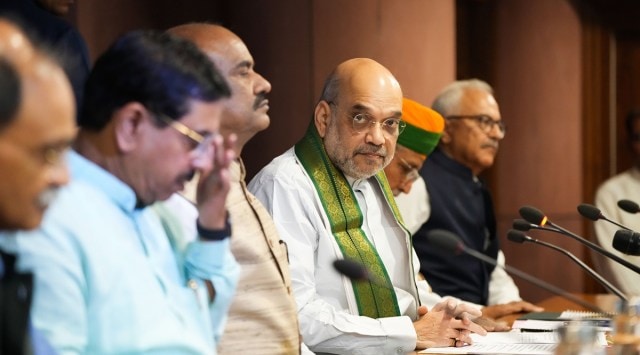Inefficient legislative drafting can weaken laws, democracy, affect democracy: Amit Shah
Shah said there should be special emphasis on not leaving a grey area. For example, while drafting the Constitution, it was clearly written in the index that Article 370 was a temporary provision.
 Union Home Minister Amit Shah with Lok Sabha Speaker Om Birla, Union Minister Pralhad Joshi and others during the inauguration of a training program on legislative drafting for state and central government officials, in New Delhi, Monday, May 15, 2023. (PTI Photo)
Union Home Minister Amit Shah with Lok Sabha Speaker Om Birla, Union Minister Pralhad Joshi and others during the inauguration of a training program on legislative drafting for state and central government officials, in New Delhi, Monday, May 15, 2023. (PTI Photo) Union Home Minister Amit Shah on Monday said legislative drafting is a crucial component of democracy and lack of knowledge about it not only weakens the laws but also the entire democratic system, which affects the functioning of the judiciary too.
Inaugurating a training programme on legislative drafting for the officers of Parliament, state legislatures, various ministries, statutory bodies and other government departments in Delhi, Shah said that it will be easier to educate about the law with minimal chances of errors by the executive. “If grey areas are left in the drafting, it would lead to encroachment in interpretation, while, if the drafting is complete and lucid, its interpretation would also be clear. It is very important for any democratic country that its legislative drafting skills keep upgrading and becoming more efficient with time,” he said.
Shah said India is acknowledged as the world’s largest democracy, and in a way, democracy was born in India as its idea emerged in India only. “We have incorporated the traditions of democracy across India. The Constitution of India is considered to be the most perfect Constitution in the world and the people who framed our Constitution not only incorporated the country’s traditional democratic values in it but also tried to modernise it according to the needs of contemporary times,” he said.
Shah said there should be special emphasis on not leaving a grey area. For example, while drafting the Constitution, it was clearly written in the index that Article 370 was a temporary provision. “Had it not been written, what would have happened then?” he asked.
“So I clearly maintain that it is of utmost importance to understand the aspiration of the legislature while drafting any law. The smooth functioning of governments also depends on legislative drafting,” Shah said.
“There are three main pillars of democracy — Legislature, Executive and Judiciary — and our Constitution framers built our entire democratic governance system on these three pillars. The functions of these three systems have been efficiently divided and the function of the legislature is to consider public welfare and problems of the people and find the solutions, following legal procedures,” the home minister said.
Shah said Parliament discusses the changes being noticed across different fields globally, and accordingly formulates new laws and amends old laws to make our system more relevant. “Consequently, following the spirit of the newly framed law, the executive performs its function of implementing it. The judiciary works independently in our country to interpret the law in case of a dispute. Our Constitution framers divided the roles of these three pillars in our entire democratic system,” he added.
“The function of the legislative department is to formulate the political will of Parliament and the Union Cabinet into law. The function of the legislative department is to provide legal format to the political will and ways to solve the problems of the people and different needs of the country and for this reason, drafting attains great importance. If the drafting is better, it will be easier to educate about the law with minimal chances of errors by the executive,” he said.
Shah said drafting should be done in as simple and clear words as possible because a law drafted in cliched words always creates controversy. “The more simple and clear the law is in words, the more it remains undisputed. Making such a law that the court does not need to intervene is a medal for drafting a good law,” he said. “Since Narendra Modi became the Prime Minister, his government has rescinded nearly 2,000 irrelevant laws. We have freed society, the lawyers and the judiciary from a jungle of laws. The government also has not shied away from making new laws whenever necessary,” he said







